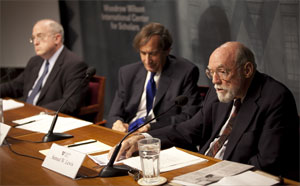The U.S.-Israeli Relationship: Where Is It Going?
Daniel C. Kurtzer, S. Daniel Abraham Chair, Middle East Policy Studies, Princeton University and Former U.S. Ambassador to Egypt and Israel; Samuel W. Lewis, Senior Policy Advisor, Israeli Policy Forum and Former U.S. Ambassador to Israel; Aaron David Miller, Public Policy Scholar, Woodrow Wilson Center and Former U.S.-Middle East Negotiator
Overview
In opening the discussion, Miller stated that the pursuit of Israeli-Palestinian peace is currently stuck. He believes that Obama has not performed well on this issue so far; though he added that this is not unusual in the first year of an administration. According to Miller, the most fascinating ingredient in the Israeli-Palestinian equation is how the U.S. manages, or in Obama's case, mismanages its relationship with Israel. He stressed that American cooperation with the Israelis is essential if the U.S. is going to achieve its objectives in this region. That does not mean that America has to roll over and do everything the Israelis want. Fighting with Israel is an occupational reality when it comes to peacemaking, he said. The point is to have the fight be on something truly consequential that moves the process forward and makes America, the Israelis, and the Arabs all look good. Obama's challenge, he concluded, was to craft a policy that is both reassuring and tough and that preserves America's special relationship while not allowing it to become exclusive.
Lewis highlighted the history of relations between the U.S. and Israel. He described relations following the Second World War – between Israel's inception in 1948 and Nixon's presidency in the mid-1960s - as "friendly but distant." He likened the U.S.-Israeli relationship to a coral reef - gradually growing over many years "through accretion," yet remaining sensitive and vulnerable to external forces. Lewis then described the U.S.-Israel relationship as a product of six elements in the post-WWII American psyche: "guilt" – for Jewish sufferings in the war; "humanitarian instinct;" "idealism" – a uniquely American enthusiasm over the notion of spreading democracy in foreign lands; "religious identification" – sharing a common Judeo-Christian biblical tradition which imparts strong ties to Israeli lands; "politics" – the influence of Jewish voters and donors; and "ignorance" – of the various people, governments and histories of the Middle East. However, in the last fifty years a seventh element has emerged to gradually take precedence: common strategic interests in the region, further deepened by the events of 9/11 and particularly centered on Iran.
 Kurtzer, taking a narrower approach to the topic, tried to reconcile reasons for Obama's "poor start" on the Israeli-Palestinian front and identified the systemic problems in the U.S.-Israeli alliance. According to Kurtzer, "two pillars" are key to the United States' ability to maintain friendly relations with Israel and Arab countries while trying to mediate and resolve the dispute: clarifying strategic interests and going beyond "distinguishing between technique and tactics." He attributed the lack of success in negotiations to several "disfunctionalities." One, there are too many official, formal channels of communication between governments and institutions. Secondly, disfunctionality is language; the role of the interlocutor is often misunderstood and over-valued. Third, diplomacy in recent years has shown an excessive reliance on the use of special envoys; they have, in fact, weakened communications. He believes both sides need to carefully and honestly assess their respective strategies and objectives. On the Israeli-Palestinian conflict, Kurtzer subscribes to a multi-faceted approach similar to the Fayad plan, which entails the build up of social and economic institutions.
Kurtzer, taking a narrower approach to the topic, tried to reconcile reasons for Obama's "poor start" on the Israeli-Palestinian front and identified the systemic problems in the U.S.-Israeli alliance. According to Kurtzer, "two pillars" are key to the United States' ability to maintain friendly relations with Israel and Arab countries while trying to mediate and resolve the dispute: clarifying strategic interests and going beyond "distinguishing between technique and tactics." He attributed the lack of success in negotiations to several "disfunctionalities." One, there are too many official, formal channels of communication between governments and institutions. Secondly, disfunctionality is language; the role of the interlocutor is often misunderstood and over-valued. Third, diplomacy in recent years has shown an excessive reliance on the use of special envoys; they have, in fact, weakened communications. He believes both sides need to carefully and honestly assess their respective strategies and objectives. On the Israeli-Palestinian conflict, Kurtzer subscribes to a multi-faceted approach similar to the Fayad plan, which entails the build up of social and economic institutions.
Drafted by Nader Mehran on behalf of the Middle East Program
Documents & Downloads
Hosted By

Middle East Program
The Wilson Center’s Middle East Program serves as a crucial resource for the policymaking community and beyond, providing analyses and research that helps inform US foreign policymaking, stimulates public debate, and expands knowledge about issues in the wider Middle East and North Africa (MENA) region. Read more
Thank you for your interest in this event. Please send any feedback or questions to our Events staff.










